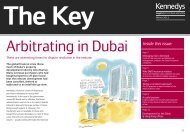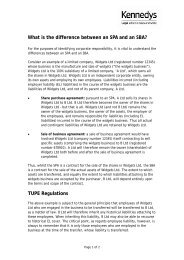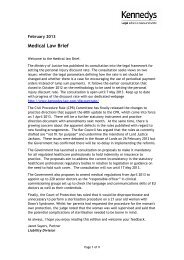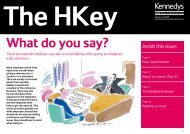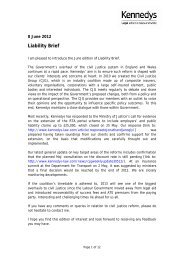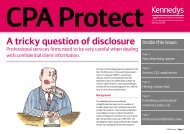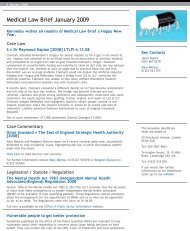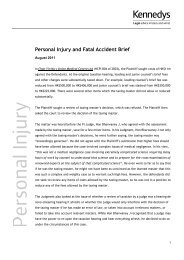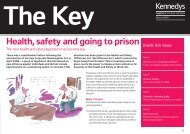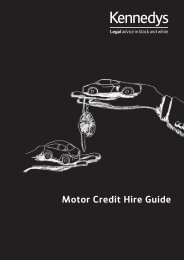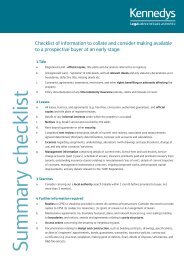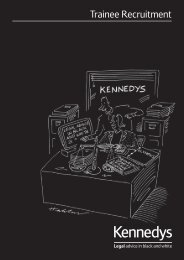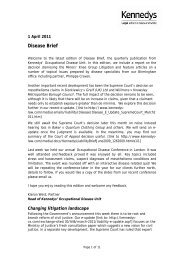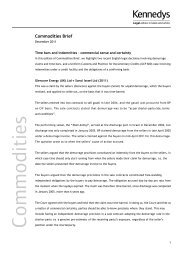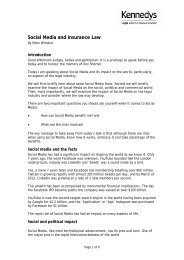Download Liability Brief - Kennedys
Download Liability Brief - Kennedys
Download Liability Brief - Kennedys
Create successful ePaper yourself
Turn your PDF publications into a flip-book with our unique Google optimized e-Paper software.
13 January 2012<br />
<strong>Liability</strong> <strong>Brief</strong><br />
Welcome to the January edition of <strong>Liability</strong> <strong>Brief</strong>.<br />
With further investment in our transport and logistics practice, I am pleased to<br />
welcome Christine Branton as a new partner in our Manchester office. Christine<br />
specialises in claims handling and defending employers’ liability and motor<br />
personal injury claims on behalf of self-insured transport operators. Her arrival will<br />
further enhance <strong>Kennedys</strong>’ existing relationships in the transport sector.<br />
In this month’s issue, Martin Stockdale, another new partner in our Manchester<br />
office, asks the question: what will become of the lying claimant? Martin, who is<br />
developing <strong>Kennedys</strong>’ counter-fraud capability, is well known for his work in<br />
respect of a number of cross-insurer organised fraud investigations. In our other<br />
feature article, Rachel Moore focuses on <strong>Kennedys</strong>’ very positive relationship with<br />
the Forum of Insurance Lawyers (FOIL).<br />
Yesterday, the Transport Select Committee published its follow up report on the<br />
costs of motor insurance and the MoJ released court statistics which, it argues,<br />
support the case for a comprehensive reform programme across the justice system.<br />
At the same time, the House of Lords continues its consideration of the LASPO Bill.<br />
Given the number of amendments that are currently being tabled, it is clear that<br />
the Bill is not going to have an easy ride. <strong>Kennedys</strong>’ Civil Justice Group continues<br />
to provide our clients with the opportunity to have a voice on these issues and has<br />
recently met with Lords Thomas and Gold. View our latest update. (links to<br />
http://www.kennedys-law.com/news/cjgweeklyupdate221211/).<br />
I hope you find this edition of interest and welcome any feedback.<br />
Richard West, Partner<br />
Head of <strong>Liability</strong> Division<br />
Case reviews<br />
Costs in RTA claims: Part 36 v Part 45<br />
Court of Appeal holds that acceptance of a Part 36 offer does not entitle a<br />
claimant to standard basis costs in a case where predictive costs would<br />
otherwise apply - Solomon v Cromwell Group Plc; Oliver v Doughty 19.12.11<br />
Page 1 of 10
In both cases, the Claimants were involved in road traffic accidents. Quantum was<br />
agreed, with the Claimants accepting Part 36 offers made by the Defendants, prior<br />
to proceedings being issued, of less than £10,000. Costs could not be agreed and<br />
both Claimants issued Part 8 proceedings for costs under the procedure set out in<br />
CPR 44.12A.<br />
Although generally costs would be assessed in this type of case on the predictive<br />
basis, there is a conflict in the CPR between CPR 36.10 and CPR 45 Section II.<br />
In both cases, the Claimants sought to argue that the Part 36 provisions meant that<br />
they had an automatic entitlement to standard basis costs which superseded the<br />
provisions of Part 45. They argued that Part 36 was essentially a deemed order for<br />
costs in its own right and that an alternative order should not, therefore, be made.<br />
In Solomon, His Honour Judge Platts overturned the initial decision of District<br />
Judge Wheeler that standard basis costs should apply. He decided that the<br />
provisions of Part 36 only applied where proceedings had been issued. Since they<br />
had not been issued, there was no deemed order for costs and the Court was bound<br />
by the provisions of 44.12A(4A).<br />
In Oliver, District Judge Smith also found that predictive costs should apply. He<br />
reached his conclusion on the basis that the effect of Part 45 is to establish the<br />
reasonable and proportionate costs of the items to which it relates for the purpose<br />
of the assessment of recoverable costs in cases of the kind to which it refers.<br />
Held: The Court of Appeal dismissed the Claimants’ appeals, holding that<br />
predictive costs should apply in both cases. Lord Justice Moore-Bick referred to the<br />
established principle that, when an instrument contains both specific and general<br />
provisions and some of those are in conflict, the general are intended to give way<br />
to the specific. He considered that, as the provisions in Part 36.10 are general and<br />
the provisions of Section II of Part 45 are specific, the provisions in Part 45 should<br />
govern the cases to which it applies.<br />
Comment: Since the introduction of predictive costs, claimants have sought ways<br />
of escaping their restrictions and limitations, for example by prematurely issuing<br />
claims or instructing counsel to attend infant approval hearings, or by any number<br />
of other increasingly inventive means.<br />
It is therefore both refreshing and reassuring to see the Court of Appeal reigning in<br />
such attempts and maintaining the spirit of the scheme as it was intended.<br />
Both these cases dealt only with proceedings issued under CPR 44.12A. However, it<br />
is always open to a claimant to issue proceedings for outstanding costs under CPR<br />
Part 7 or Part 8 instead. Lord Justice Moore-Bick, whilst accepting he was not<br />
considering this issue, did however consider that it was “very doubtful” such an<br />
attempt to avoid predictive costs would be successful.<br />
For further information please contact Elizabeth Love on +44 114 253 2048 or email<br />
e.love@kennedys-law.com.<br />
Page 2 of 10
Credit hire: mitigation of loss<br />
Credit hire issues return to the Court of Appeal; appeal succeeds where Judge<br />
failed to follow previous Court of Appeal decision in Copley v Lawn - Sayce v<br />
TNT (UK) Ltd 19.12.11.<br />
Following a road traffic accident, Miss Sayce brought a claim, all elements of which<br />
were settled apart from a credit hire claim for £3,446.28. At the time of the<br />
accident the driver of the other vehicle, an employee of TNT, gave her a card<br />
asking her to contact TNT as soon as possible. She phoned TNT that day and her<br />
attention was drawn to a paragraph on the back of the card headed “Mitigation of<br />
losses”, which included an offer to provide a hire vehicle free of charge. Miss Sayce<br />
did not accept TNT’s offer but obtained a replacement vehicle under a credit hire<br />
arrangement.<br />
At first instance, District Judge Flood found that Miss Sayce had failed to mitigate<br />
her loss and so could not recover from TNT. Prior to the hearing of the appeal, the<br />
Court of Appeal gave judgment in Copley v Lawn [2009] (link to<br />
http://www.kennedys-law.com/casereview/credithirecostrecovery/) However, His<br />
Honour Judge Charles Harris QC dismissed Miss Sayce’s appeal. He declined to<br />
follow the decision in Copley because he considered it was inconsistent with<br />
several previous decisions of the House of Lords and Court of Appeal.<br />
On appeal to the Court of Appeal, the parties agreed that the appeal should be<br />
allowed. TNT made it clear however that it intended to seek permission to appeal<br />
to the Supreme Court, on the grounds that the decision in Copley was inconsistent<br />
with established authority and wrong as a matter of principle.<br />
Held: The appeal was allowed. The Judge was not entitled to decide the case on a<br />
basis fundamentally different from that on which it had been argued. In addition,<br />
he ought to have applied the principles set out in Copley.<br />
Giving the leading judgment, Lord Justice Moore-Bick indicated that he has<br />
difficulty with the conclusion that a claimant who has unreasonably refused an<br />
offer from the defendant of a free car can recover “at least the cost which the<br />
defendant can show he would reasonably have incurred.” In his view the appeal in<br />
this case had brought to the surface some important questions about the current<br />
state of the law on mitigation, which have implications beyond the confines of road<br />
traffic accident cases. However, given that (1) TNT accepted that the appeal must<br />
in the circumstances succeed, and (2) in Copley permission to appeal was sought<br />
from the Supreme Court but refused, it would not be right to give permission to<br />
appeal in this case.<br />
Comment: The Court of Appeal’s judgment is an unfortunate setback for defendant<br />
insurers, effectively closing the door on arguments that a defendant should not be<br />
liable to compensate a claimant who has failed to mitigate loss by unreasonably<br />
rejecting an offer of intervention hire. The Court of Appeal made it plain that the<br />
decision in Copley v Lawn should be considered binding on lower courts, regardless<br />
of any criticisms.<br />
Page 3 of 10
Despite that, Moore-Bick LJ did accept that there were “important questions about<br />
the current state of the law on mitigation which have implications beyond the<br />
confines of road traffic accident cases”. He felt that it would be beneficial for<br />
these questions to be considered at the highest level as soon as a suitable<br />
opportunity arises.<br />
Read our reports on the recent Court of Appeal credit hire decisions in Bent v<br />
Highways and Utilities Construction Ltd and Allianz Insurance and Pattni v First<br />
Leicester Buses Ltd. (link to http://www.kennedyslaw.com/casereview/basichirerate/<br />
and http://www.kennedyslaw.com/casereview/pecuniousclaimant/)<br />
For further information please contact Graham Thompson on +44 114 253 2073 or<br />
email graham.thompson@kennedys-law.com or contact Oliver Tucker on +44 114<br />
253 2074 or email o.tucker@kennedys-law.com.<br />
Feature articles<br />
Focus on FOIL<br />
With an Executive Committee made up of representatives from member firms,<br />
including Rachel Moore of <strong>Kennedys</strong>, the Forum of Insurance Lawyers (FOIL) is a<br />
powerful force in the industry. Originally formed to sit alongside the Association of<br />
Personal Injury Lawyers to ensure that the full range of views was heard, FOIL has<br />
developed and widened its focus into defence insurance generally.<br />
For anyone involved in the liability world, the current changes under consideration<br />
are variously seen as presenting opportunities and threats to the way of life as we<br />
know it. Whilst many firms will be keeping themselves and their clients ahead of<br />
the game (for example you will see regular updates from <strong>Kennedys</strong>’ Civil Justice<br />
Group within <strong>Liability</strong> <strong>Brief</strong>) many defence insurance practitioners will also be<br />
members of FOIL. As the voice of the defendant insurance lawyer community, FOIL<br />
is pushing for a more transparent and proportionate claims environment.<br />
What does FOIL do?<br />
A few statistics from the last year might help:<br />
<br />
16 Sector Focus Teams (SFTs) - the SFTs are made up of experts in their field.<br />
They are responsible for feeding back detailed comment and review on the live<br />
issues in that area, whilst also being a positive driver for FOIL policy, through<br />
input into the consultation responses and articles. <strong>Kennedys</strong> supports many of<br />
the SFTs. Tim Wilson is involved in the catastrophic injury SFT and hosted its<br />
workshop on periodical payments in October 2011, at which a number of<br />
insurers were represented. Tom Armstrong and Kathy Dwyer are involved in the<br />
Page 4 of 10
clinical negligence and credit hire SFTs respectively. Michael Howard is in the<br />
professional indemnity SFT. Robert Welfare has hosted a FOIL fraud event at<br />
our Birmingham office as part of his role in the policyholder fraud SFT.<br />
<br />
<br />
<br />
<br />
6 Regional Representatives - this is how FOIL ensures that its lobbying strength<br />
reaches all parts of the UK. Amanda Wylie, Partner in <strong>Kennedys</strong>’ Belfast office,<br />
is the Northern Ireland Regional Representative. With her FOIL hat on, Amanda<br />
has responded to a Northern Ireland consultation on access to justice and the<br />
Assembly’s consultation on pleural plaques legislation, including appearing<br />
before the Committee at Stormont.<br />
15 formal lobbying meetings – FOIL hold regular meetings with the MoJ, ABI,<br />
APIL, MASS and Law Society. They are invited as of right to put forward<br />
submissions on all consultations on insurance and legal issues on behalf of<br />
defendant insurance lawyers.<br />
16 consultation responses – FOIL has responded on issues ranging from the<br />
Löfstedt report on health and safety to the consultation on a charter for the<br />
current coroner service. FOIL’s members’ interests are often closely aligned<br />
with those of insurers and therefore the ABI and insurers welcome the detailed<br />
input that FOIL can add to the debates.<br />
24 newsletters– the VOICE is published twice a month by Shirley Denyer, FOIL’s<br />
knowledge management consultant, who keeps readers up to date with the<br />
issues currently under debate within the industry.<br />
Hot topics<br />
Every reader will have their own personal interests, but the following is a snapshot<br />
of the current hot topics where FOIL is heavily involved:<br />
<br />
<br />
<br />
Discount rate consultation – expected to cover the methodology to be used in<br />
setting the discount rate when calculating personal injury damages (currently<br />
2.5%). This consultation has been awaited for some months and is now expected<br />
in early 2012.<br />
Legal Aid, Sentencing and Punishment of Offenders Bill (LASPO) – currently<br />
at committee stage in the House of Lords. The Bill covers legal aid provision,<br />
banning of referral fees, recoverability of conditional fee arrangement success<br />
fees and after the event insurance premiums, amongst other issues.<br />
“Solving disputes in the county courts” consultation – which sought views on<br />
reforming the civil justice system, based on Lord Justice Jackson’s review and<br />
Lord Young’s report “Common Sense, Common Safety”. The Government’s<br />
response is now expected in early 2012 – expect proposals for an extension of<br />
the RTA portal scheme to RTA claims up to £25,000 and to other types of claims<br />
Page 5 of 10
(including EL/PL claims), together with a greater emphasis on alternative<br />
dispute resolution.<br />
<br />
<br />
<br />
<br />
Credit hire judgments – including the ongoing saga relating to the<br />
reasonableness or otherwise of “basic hire rates” in motor cases (Bent v<br />
Highways and Utilities Construction Ltd and Allianz Insurance [2011]) and<br />
restrictions on recoverability of interest on credit hire charges (Pattni v First<br />
Leicester Buses Ltd [2011]). (links to http://www.kennedyslaw.com/casereview/basichirerate/<br />
and http://www.kennedyslaw.com/casereview/pecuniousclaimant/)<br />
Law Commission consultation on insurance law – a consultation has just been<br />
launched, covering issues such as whether an insured should receive damages<br />
for late payment of a valid claim, insurers’ remedies for fraudulent claims,<br />
clarification of the principle of insurable interest and policies and premiums in<br />
marine insurance. Responses are due by 20 March 2012.<br />
Taylor Review: expenses and funding in civil litigation in Scotland – this is<br />
Scotland’s equivalent of the consultation on the Jackson reforms. Responses are<br />
due by 16 March 2012.<br />
MoJ consultation on court fees in the High Court and Court of Appeal – with<br />
responses due by 7 February 2012, this consultation looks at reforming the fee<br />
structure in expectation of a situation where the High Court and Court of<br />
Appeal focus on the highest value and most complex disputes, as a result of the<br />
ongoing reform of the civil justice system.<br />
In short, expect to hear a lot more from FOIL (and <strong>Kennedys</strong>) in the coming<br />
months!<br />
For further information please contact Rachel Moore on +44 20 7667 9221 or email<br />
r.moore@kennedys-law.com.<br />
Lies, lies and damn lies<br />
With Summers v Fairclough Homes Ltd being heard by the Supreme Court in April<br />
2012, we consider whether the nature of the fraud game is changing and ask the<br />
question: what will become of the lying claimant?<br />
Insurers are lied to. Whether in first party claims on a policy or by a third party<br />
claimant, it is a sad reality they face everyday. As insurers fight fraudulent claims<br />
and exaggeration, the message from the courts remains mixed. The duty of good<br />
faith has allowed insurers to repudiate first party claims in full, but the courts have<br />
not so far been willing to apply the same principle to a dishonest third party<br />
claimant.<br />
Page 6 of 10
Courts’ powers<br />
A court has the power to penalise a dishonest claimant in two ways; either in costs<br />
or by striking out the claim under CPR 3.4(2).<br />
An insurer may also ask the court to apply sanctions for contempt of court. CPR<br />
32.14 provides that proceedings for contempt of court may be brought against a<br />
person if he makes, or causes to be made, a false statement in a document verified<br />
by a statement of truth without an honest belief in its truth. The penalty for<br />
contempt is either a custodial sentence or a fine.<br />
Early judicial response<br />
The courts originally considered fabricated claims to be more serious a deception<br />
than exaggerated claims and were minded to impose more severe sanctions on<br />
claimants who supported entirely fabricated claims:<br />
<br />
<br />
<br />
<br />
<br />
Ghalib and Ghaffar v Hadfield [2004] – this case featured a phantom<br />
passenger claim. Although the claim by the passenger, Mr Sadik was<br />
discontinued before trial, the remaining Claimants maintained throughout<br />
that Mr Sadik was in the vehicle at the time of the collision. The following<br />
guidelines were given by Preston County Court for consideration of<br />
whether a claim should be struck out: (1) to what extent had the claimants<br />
failed to help further the overriding objective; and (2) whether, in light of<br />
the conclusions on (1), the court should exercise its discretion and strike<br />
out the statements of case under CPR 3.4(2). Although the claims were not<br />
struck out in this instance, no damages were awarded, as the Claimants’<br />
credibility had been tarnished by supporting the phantom claim.<br />
Caerphilly County Borough Council v Hughes and others [2005] - the<br />
Council brought contempt proceedings after Mr Hughes claimed to have<br />
been injured following a trip on a broken flagstone. His friends supported<br />
his account. However, during the course of the original claim it transpired<br />
that he had in fact been injured playing football. Mr Hughes received a<br />
custodial sentence of 14 days and his witnesses were fined £1,500 each.<br />
Patel and others v Ali [2006] – the County Court struck out the claims of<br />
all four Claimants after considering the guidelines laid down in Ghalib and<br />
finding that there had only been two occupants in the Claimants’ vehicle.<br />
Khan and others v Hussain and others [2007] - Huddersfield County Court<br />
used its case management powers to strike out the claims of genuine<br />
Claimants who supported the fraudulent claim of a phantom passenger.<br />
Ul-Haq and others v Shah [2009] - the Court of Appeal declined to strike<br />
out the claims of the genuine Claimants and questioned whether they had<br />
Page 7 of 10
the power to impose such a sanction. Instead of striking out the claims,<br />
the Court penalised the Claimants in costs, which negated the<br />
compensation awarded.<br />
<br />
Kirk v Walton [2009] - the Claimant claimed damages in excess of<br />
£770,000 but later accepted £25,000, following disclosure of surveillance<br />
evidence. The Claimant was fined £2,500 following contempt proceedings<br />
and was ordered to pay a significant part of the insurer’s costs. Such a<br />
sanction can only be an effective deterrent where the costs order and fine<br />
outweigh the compensation.<br />
Contempt of court<br />
The latest decisions on contempt of court suggest that the courts’ stance has<br />
changed and that exaggerated claims are now considered just as serious as<br />
fabricated claims. The decisions do, however, raise the question of whether the<br />
courts consider exaggerated claims brought against the Motor Insurers’ Bureau, a<br />
non-profit organisation and a last resort, as more serious than exaggerated claims<br />
brought against insurers:<br />
<br />
<br />
<br />
Motor Insurers’ Bureau v Richards and others [2011] - Mr Richards<br />
sought to recover damages in excess of £2m following a road traffic<br />
accident. His claim was supported by witness evidence from his sister and<br />
foster father. The MIB obtained surveillance footage which showed that Mr<br />
Richards was severely exaggerating the extent of his injuries. He<br />
subsequently withdrew his claim and the MIB pursued contempt<br />
proceedings against all three. Mr Richards received a four month custodial<br />
sentence, his sister 14 days and his foster father 14 days, suspended for six<br />
months.<br />
Motor Insurers’ Bureau v Shikell and others [2011] - Mr Shikell claimed<br />
damages in excess of £1.2 million against the MIB following a road traffic<br />
accident in which he suffered a head injury. The MIB pursued contempt of<br />
court proceedings against Mr Shikell, his father and a witness after they<br />
obtained surveillance evidence which showed Mr Shikell had exaggerated<br />
his claim. Mr Shikell and his father received custodial sentences of 12<br />
months and the witness was fined £750.<br />
esure Services Ltd v Shah [2011] - esure brought contempt proceedings<br />
against Mr Shah arising from what was believed to form part of a wider<br />
fraudulent conspiracy. He was sentenced to six months imprisonment<br />
following the proceedings.<br />
Brighton & Hove Bus & Coach Company Ltd v Brooks and others [2011] -<br />
contempt proceedings were brought against three family members for<br />
supporting the exaggerated personal injury claim brought by the mother of<br />
Page 8 of 10
the family. The exaggeration was exposed after surveillance evidence was<br />
obtained by the insurer. Two of the Defendants were found to be in<br />
contempt. The Judges considered the false statements made by the<br />
Defendants over a period of two and a half years to be “serious<br />
contempt”, but declined to impose immediate imprisonment sentences,<br />
instead suspending the sentences for 12 months. When considering the<br />
judgment, it is apparent that the Court did not consider exaggerating a<br />
claim to be as severe a contempt as bringing an entirely fictitious claim:<br />
“this is not a case where the entire claim put forward … was a false one.”<br />
<br />
Lane v Shah [2011] - contempt proceedings were brought against the<br />
Claimant and her family after they signed false statements of truth<br />
supporting an exaggerated injury claim. The Claimant had originally<br />
claimed special damages totalling almost £637,000 in addition to general<br />
damages. Ultimately, the Claimant accepted an offer of £10,000. This was<br />
offset against the insurer’s costs of investigating the fraud. The Court<br />
described the statements as “calculated, deliberate lies” and imposed<br />
immediate sentences on the Claimant and her family of six and three<br />
months.<br />
Alternative approaches<br />
Are contempt proceedings the only and the best means by which insurers can get<br />
across the message that fraudulent claims will not be tolerated? Custodial<br />
sentences will clearly send the right message to those bringing fraudulent claims,<br />
but is the costly and lengthy process worth it?<br />
Following Ali v esure Services Ltd [2011], orders for committal for contempt of<br />
court can be heard before one judge sitting in the High Court, where the<br />
proceedings are already proceeding in the High Court, thus saving the time and<br />
expense of transferring the claim to the Divisional Court. Where proceedings<br />
remain in the county court, the application for committal must still be made to the<br />
Divisional Court.<br />
Are costs sanctions considered a serious consequence to claimants committing<br />
fraud? In many cases, claimants faced with adverse costs orders do not have the<br />
means to satisfy the orders. Unless a claimant owns a property, or has other<br />
identifiable assets, it is uneconomical for insurers to throw good money after bad<br />
in an attempt to recover what is owed.<br />
Should the insurer’s appeal in Summers v Fairclough Homes Ltd succeed, insurers<br />
could seek the strike out of all (even genuine) parts of claims where fraud exists.<br />
However, some commentators see the decision in Ul-Haq v Shah as a hurdle to the<br />
appeal. Could the fact that Summers features an exaggerated, rather than a<br />
fabricated, claim mean that the Supreme Court may not consider the fraud to be<br />
“as serious”?<br />
Page 9 of 10
Looking ahead<br />
So what could the Supreme Court’s decision in Summers mean for insurers and<br />
insureds?<br />
Appeal successful<br />
1. Full repudiation of claims where a<br />
claimant has been dishonest.<br />
2. A shift in the claimant risk<br />
assessment around litigation can be<br />
expected.<br />
3. Where exaggeration is easily<br />
evidenced, more complicated fraud<br />
arguments can be left out of<br />
proceedings.<br />
4. Exaggeration for “negotiation<br />
purposes” will be driven out of claimant<br />
behaviours.<br />
Appeal unsuccessful<br />
1. Exaggeration remains a tool with<br />
which to attack claimant credibility.<br />
2. All current available sanctions will<br />
remain available to defendants,<br />
including costs and committal<br />
proceedings.<br />
3. Defendants will continue to think<br />
commercially in respect of fraudulent<br />
exaggeration.<br />
4. Subjective losses (i.e. soft tissue<br />
injuries) remain open to attack in full as<br />
are predicated on a claimant’s<br />
credibility.<br />
5. Reduction in costs. 5. Objectively evidenced losses should<br />
be assessed proactively and settled<br />
quickly.<br />
The appeal will take place in the Supreme Court on 18 and 19 April 2012.<br />
For further information please contact Martin Stockdale on +44 161 829 7456 or<br />
email m.stockdale@kennedys-law.com or contact Helen Edwards on +44 1618 297<br />
463 or email helen.edwards@kennedys-law.com.<br />
<strong>Kennedys</strong> is a trading name of <strong>Kennedys</strong> Law LLP. <strong>Kennedys</strong> Law LLP is a limited liability partnership<br />
registered in England and Wales (with registered number OC353214).<br />
Page 10 of 10



